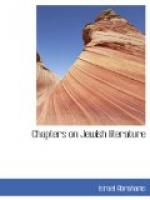The course of Jewish literature in Italy ran along the same lines as in Spain. The Italian group of authors was less brilliant, but the difference was one of degree, not of kind. The Italian aristocracy, like the Moorish caliphs and viziers, patronized learning, and encouraged the Jews in their literary ambitions.
Yet the fact that the inspiration in Spain came from Islam and in Italy from Christianity produced some consequences. In Spain the Jews followed Arab models of style. In Italy the influence of classical models was felt at the time of the Renaissance. Most noteworthy of all was the indebtedness of the Hebrew poets of Italy to Dante.
It is not improbable that Dante was a personal friend of the most noted of these Jewish poets, Immanuel, the son of Solomon of Rome. Like the other Jews of Rome, Immanuel stood in the most friendly relations with Christians, for nowhere was medieval intolerance less felt than in the very seat of the Pope, the head of the Church. Thus, on the one hand Immanuel was a leading member of the synagogue, and, on the other, he carried on a literary correspondence with learned Christians, with poets, and men of science. He was himself a physician, and his poems breathe a scientific spirit. As happened earlier in Spain, the circle of Immanuel regarded verse-making as part of the culture of a scholar. Witty verses, in the form of riddles and epigrams, were exchanged at the meetings of the circle. With these poets, among whom Kalonymos was included, the penning of verses was a fashion. On the other hand, music was not so much cultivated by the Italian Hebrews as by the Spanish. Hence, both Immanuel and Kalonymos lack the lightness and melody of the best writers of Hebrew verse in Spain. The Italians atoned for this loss by their subject-matter. They are joyous poets, full of the gladness of life. They are secular, not religious poets; the best of the Spanish-Hebrew poetry was devotional, and the best of the Italian so secular that it was condemned by pietists as too frivolous and too much “disfigured by ill-timed levity.”
Immanuel was born in Rome in about 1270. He rarely mentions his father, but often names his mother Justa as a woman of pious and noble character. As a youth, he had a strong fancy for scientific study, and was nourished on the “Guide” of Maimonides, on the works of the Greeks and Arabs, and on the writings of the Christian school-men, which he read in Hebrew translations. Besides philosophy, mathematics, astronomy, and medicine, Immanuel studied the Bible and the Talmud, and became an accomplished scholar. He was not born a poet, but he read deeply the poetical literature of Jews and Christians, and took lessons in rhyme-making. He was wealthy, and his house was a rendezvous of wits and scientists. His own position in the Jewish community was remarkable. It has already been said that he took an active part in the management of communal affairs, but he did more than this. He preached in the synagogue on the Day of Atonement, and delivered eulogistic orations over the remains of departed worthies. Towards the end of his life he suffered losses both in fortune and in friends, but he finally found a new home in Fermo, where he was cordially welcomed in 1328. The date of his death is uncertain, but he died in about 1330.




